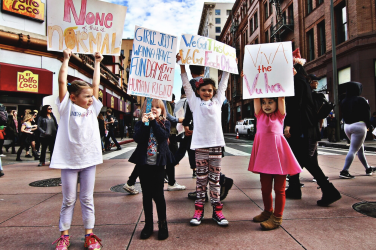Many of us continue to deal with insecurities about our bodies, even as we grow up to be independent adults. Author Zsofi Borsi, who writes for Lazy Women and was re-published at our partner A Tribe of Women, takes us with her on an intimate journey, confronting herself with the insecurities that continue to influence her until today.
Besides making sure I met the academic requirements of being a ‘top student’, there were two things I wholeheartedly cared about during my high school years: boys that had no idea of my existence, and my weight. Sadly, I suspect this might be very relatable for a lot of you out there.
From non-eating to over-exercising, bingeing to clean eating, I’ve been through it all. And oh, please, let’s not forget about the stage when you think ‘you’re over it’ and convince yourself that learning about nutrition and ‘healthy’ baking means you’ve turned this into something worthy, you’ve in a way, became superior to those eating just whatever they want.
For a long time, I personally thought that I was living a healthier life than most of my friends. It didn’t help that most people confirmed this by comments such as ‘you’re always so fit, you must be so healthy’, ‘how did you lose so much weight without starving yourself?’, and so on. Counting the number of apples you can eat a day. Healthy? Oh, those endless evenings spent doing workout videos on Youtube. The voice of Cassey Ho from Blogilates reminding you that ‘for good things in life, for change, for having a nice booty, you need to suffer’. I believed it all – and I must admit, a part of me still does even today. Still think it’s healthy?
Did it really serve me good to desperately try to turn an eating disorder into habits that people perceive as admirable, efficient or inspiring?
Where do you draw the line between forms of behaviour that are seen as normal, what counts as a ‘normal’ amount of effort put into eating habits? Sure, meal-prepping to save some money and to genuinely be a bit more thoughtful about what you put into your body is fine, and in some situations desirable. Yet it is a slippery slope from this portrayed balance to scenarios that are even though fit into your mindful image, but actually serve the goal of self-loathing. For example, making your multiple-layered overnight chia breakfast pudding late night just to be able to be near, to smell, to touch food. Or curating an Instagram account to post about your ‘baked goodies’, just to be able to fantasise about recipes – to feel this sense of closeness to food when you’re just oh so empty inside. What I’m trying to get at here is this: did it really serve me good to desperately try to turn an eating disorder into habits that people perceive as admirable, efficient or inspiring? These days, I am less and less sure about it.
Recently, during lock-down, I spent a couple of days in my old room at home. I just needed a paper to write some things down on, but I accidentally came across a diary from 2017. A good old to-do-list (God how I love making them!), reminding my 2020-self that ‘the one thing [I wanted] to achieve’ during my Erasmus was to ‘lose weight’. I was shocked. Not because this is something that I didn’t think I would write down, but because it was written only a mere three years ago.
I wondered – if I keep looking, how many entries like this will I find in my old room? How much of my diaries consisted of promising myself that this year, month, or a week, I will “change” myself (by starving)? I’ve always considered myself a critical thinker and never one to conform. Has it all been a big fat – or rather skinny – lie?
Here’s what I found. The entries speak for themselves.



Today, looking at these notes again, I feel like a hopeless addict confronted with the lies they’ve told to themselves and to the ones they love. In the past years, I have definitely let go of letting my body define me, but perhaps not as much as I made myself believe.
While these notes made sure over the years that I did not gain substantial weight, I also did not manage to lose any: I look more or less the same weight-wise on all the pictures taken from this significant and defining time of my life. How very disappointing! All this effort, thinking, making plans, for literally nothing? No, not for nothing: for messed up blood test results and hormones, hair that falls out too easily and a never-ending feeling of being too cold. And then there’s the non-physical side. Knowing how many calories are in each specific dish is not something you just get rid of. Or, of the urge to look into the mirror after eating, trying to guess whether you look different from the half pizza you just had. To observe the feeling of being full with strange alertness; to imagine and direct all your attention to your heaviness. I would love to say there’s something more to this experience, something positive to come out with, a good that comes with the bad, a silver lining, but I truly don’t think there is, at least, not yet.
I look more or less the same weight-wise on all the pictures taken from this significant and defining time of my life
Just because I know I’m not alone with this, and I also know – what many of people told me over the years, when I tried to open up about this – that I wasn’t ‘properly’ anorexic, that I wasn’t properly killing myself (really, thanks for that!), it is still an issue that we should speak more openly about. No matter how specific my diary notes are, what I’m talking about is no doubt a systematic experience. It is not because of anything unique to me that I went through this, but because I am conditioned to be constantly instructed to bare down the worth of my existence to my body.
So what can be done to give meaning to all these notes urging me to become thinner? Opening up about it to friends or seeking professional help is a first and necessary step. I do believe that the rest cannot be done on an individual level, though. We need to connect the dots and realise that in one way or another, how many people, particularly women, are affected by external pressures regarding body image. Positive change will come from coming together and admitting the extent to which most of us have had a period when weight defined a large part of our existence. From finding comfort in sharing and listening, and in knowing that none of us, even those who you think, are necessarily over this – and that we might never be. From debating this topic in a safe space where everyone feels heard and you won’t be shut down by people who think you’re too dramatic.
Whether you are personally affected by the topic of weight loss right now or not, I must re-emphasise, this is not something solely personal. Everyone who has the privilege to be concerned with such issues have a collective responsibility to change the way we perceive and the significance we attribute to one’s weight.
If my diary entries or this article resonate with you in any way, I invite you to join me in opening the preferably raw and honest, no-shits-given dialogue around this topic!
This article was originally published on www.lazywomen.com and came to us via A Tribe Of Women (ATOW), with which E&M collaborates.
Cover photo: Siora Photography (Unsplash license).





